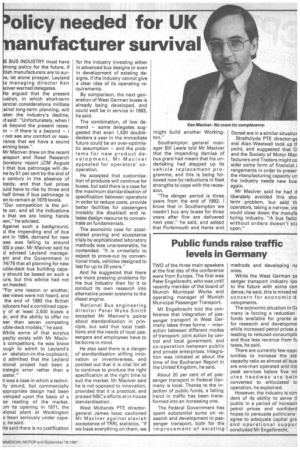olicy needed for UK nanufacturer survival
Page 19

If you've noticed an error in this article please click here to report it so we can fix it.
lE BUS INDUSTRY must have strong policy for the future, if itish manufacturers are to surte, let alone prosper, Leyland is managing director Ken 3civer warned delegates.
He argued that the present uation, in which short-term 'andel considerations militate ainst long-term planning, will sten the industry's decline, rd said: "Unfortunately, when I ok beyond the present reces)n — if there is a beyond — I • not see any comfort or reasrance that we have a sound arming base."
Mr Maciver drew on the recent ansport and Road Research boratory report .(CM August ) that bus patronage will dene by 51 per cent by the end of e century in the absence of bsidy, and that fuel prices )uld have to rise by three and half times if bus patronage is en to remain at 1979 levels. "Our competition is the prite car, and all the indications a that we are losing hands iwn," he advised.
Against such a background, d the impending end of bus ant in 1984, demand for new ises was falling to around 500 a year. Mr Maciver said he d advised Leyland manageant and the Government in 74/75 that all planning for new luble-deck bus building capay should be based on such a ure, but this advice had not en heeded.
"For one reason or another, ase views were not heard, and the end of 1980 the British oducers had a combined capey of at least 2,500 buses a ar, and the ability to offer no Ner than seven competing ,uble-deck models," he said. While some of that surplus pacity exists with Mr Macivs competitors, he was brave ough to admit to Leyland's vn skeleton-in-the-cupboard, d admitted that the Leyland itional project had been a trategic error rather than a ;aster."
It was a case in which a techniIly sound, but commercially appropriate design had been veloped upon the basis of a se reading of the market. Dm its opening in 1971, the Mona] plant at Workington s been seriously under capay, he said.
He said there is no justification for the industry investing either in advanced bus designs or even in development of existing designs, if the industry cannot give a clear idea of its operating re-quirements.
By comparison, the next generation of West German buses is already being developed, and could well be in service in 1983, he said.
The combination, of low demand — some delegates suggested that even 1,500 doubledeckers a year in the immediate future could be an over-optimistic assumption — and the problems for new product development, Mr Maciver appealed for operators' cooperation.
He accepted that customisation of products will continue for buses, but said there is a case for the maximum standardisation of specification between operators in order to reduce costs, provide better facilities for passengers (notably the disabled) and release design resource to concentrate on fundamentals.
The economic case for accelerated proving and acceptance trials by sophisticated laboratory methods was unanswerable, he contended. "It is unrealistic to expect to prove-out by conventional trials, vehicles designed to last for up to 20 years."
And he suggested that there are more pressing problems for the bus industry than for it to conduct its own research into alternative power systems to the diesel engine.
National Bus engineering director Peter Wyke Smith accepted Mr Maciver's points about standardisation in principle, but said that local traditions and the needs of local passengers and employees have to be borne in mind.
He also said there is a danger of standardisation stifling innovation or inventiveness, and pointed out that it is vital for all to continue to produce the right specification at the right time to suit the market. Mr Maciver said he is not opposed to innovation, provided that it is practical, and praised NBC's efforts at in-house standardisation.
West Midlands PTE directorgeneral James Isaac cautioned Mr Maciver against slavish acceptance of TRRL statistics. "If we base everything on them, we might build another Workington."
Southampton general manager Bill Lewis told Mr Maciver that the impending demise of bus grant had meant that his undertaking had stepped up its vehicle replacement programme, and this is being followed now by reductions in fleet strengths to cope with the recession.
"The danger period is three years from the end of 1982. I know that in Southampton we needn't buy any buses for three years after five are delivered next year," he said, and added that Portsmouth and Hants and Dorset are in a similar situatior
Strathclyde PTE director-gE eral Alan Westwell took up if point, and suggested that Cl and the Society of Motor Man facturers and Traders might co sider some form of financial rangements in order to preser the manufacturing capacity un the industry needs new bus, again.
Mr Maciver said he had d liberately avoided this shol term problem, but said th operators, taking a narrow, vie could close down the manufa turing industry. "A bus facto without orders doesn't ste open."








































































